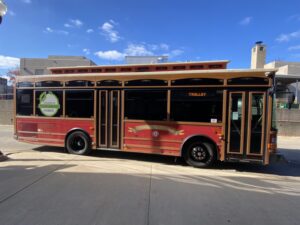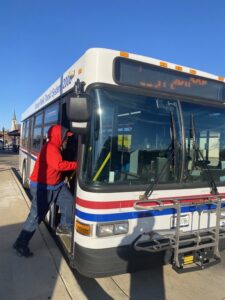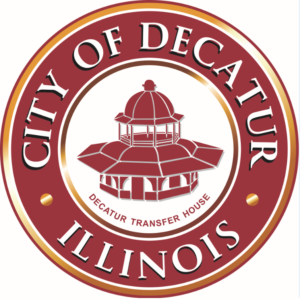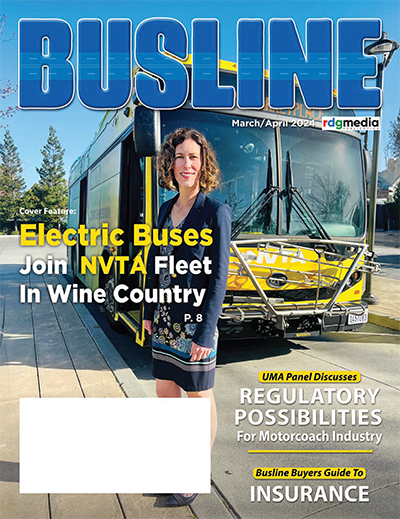Decatur (IL) Public Transit System Expanding Travel Opportunities
Goal Set To Have A Zero-Emission Fleet By 2035
By Rick Mullen Busline Magazine
During the past several years, the city government of Decatur, IL, and other civic-minded people and organizations, have worked to transform the town’s downtown to a thriving, hip destination for shopping, restaurants and other entertainment possibilities.
One of the unique benefits of the revitalization is a trolley service provided by the Decatur Public Transit System (DPTS). 
“Our downtown area is very small. About 10 years ago, the area began to undergo a total revitalization — it is now very beautiful,” said DPTS Transit Administrator Lacie Elzy, MBA, during a recent interview with Busline Magazine.
To help people get around the downtown area, DPTS runs a unique hybrid-electric bus, retrofitted to look like a traditional trolley, that operates on what the agency calls its “pulse system.”
“The pulse (trolley) operates on a 15-minute, closed- course cycle every day — and it is free,” Elzy said. “People can hop on and off at any time.”
Elzy explained that often transit systems the size of DPTS have few “choice riders.” In general, public transportation has traditionally been stigmatized as a not very desireable means of transportation. In recent years, the public transportation industry has worked diligently to reverse the public’s perception. It has done so by emphasizing and demonstrating that riding the bus can be an enjoyable, safe and efficient travel option, as well as a key element in driving economic growth, while protecting the environment.
“During the past year, we have put an emphasis on embracing being community-minded more than ever before,” Elzy said. “To combat the old stereotypical views of public transportation, we have partnered with other agencies that are utilizing public transportation as a cost effective and environmentally friendly option. We have also promoted our downtown trolley as a viable alternative to finding parking, which is at a premium downtown.
“For example, people can take the bus to our downtown hub, then hop on the trolley to their favorite restaurant. Or, one option under consideration is for people to drive their personal vehicles to the very large parking lot at the Decatur Civic Center, then catch the trolley.
“Furthermore, the trolley has been an element of such events as the city’s Mardi Gras, the downtown Christmas walk and ‘Witches Night Out’ on Halloween.”
Of course, DPTS’ service extends from downtown to include all of the city of Decatur, which has a population of a little more than 69,500 people, according to the U.S. Census Bureau.
Decatur is the largest city, and the county seat, of Macon County. DPTS services about 47 square miles with its 16 fixed-routes and on-demand paratransit service, called “Operation Uplift,” Elzy said.
“For the fixed-route service, we are now averaging around 960,000 riders a year,” Elzy said. “Pre-COVID, we always averaged more than 1 million riders a year. In fiscal 2022, we reached the 900,000 mark, as we are recovering from the height of the pandemic.
“Furthermore, we average 81,000 paratransit miles per year. Our overall ridership has been steadily increasing, and we are confident we will regain the 1 million-plus mark again. It will take a little time to get there.”
Operation Uplift is a curb-to-curb, shared-ride service for individuals who cannot independently use the Decatur public transit fixed-routes. It is available during the days and hours the fixed-route system operates.
“All of our fixed-route buses are equipped with ramps and can accommodate wheelchairs,” Elzy said. “ADA paratransit eligibility is based, not just on the presence of a disability, but on the effect that the disability has on the person’s ability to use the fixed-route service.
“The applicant’s physical and mental abilities in relation to getting on and off a bus, riding the bus, and traveling to and from a bus stop will be considered when determining eligibility for paratransit services.”
One important ridership demographic is students who attend the city’s various schools and colleges. The Decatur Public Schools (DPS) system includes two high schools. DPS pays for discounted student passes, and then provides the passes to students for free.
In addition, Millikin University and Richland Community College call Decatur home. Millikin is a private university founded in 1901 by prominent Decatur businessman James Millikin, and is affiliated with the Presbyterian Church. Richland is part of the Illinois Community College System.
“We provide a route that goes directly to Richland Community College,” Elzy said. “In addition, we have peak routes during the school year for the city’s two high schools. During the school year, we see an increase in ridership because of students.”
DPTS is also looking to further engage with Millikin in the coming years.
“Millikin has a high number of international students,” Elzy said. “Many of those students don’t have drivers licenses, so they depend on our transit system to go to the grocery store, etc.”
Traveling about the city by bicycle is another viable transportation option available to students and other citizens. All of DPTS’ buses are equipped with bike racks.
“In Decatur, we have a robust network of bike paths. They connect to many of our parks. DPTS is focusing on installing bike racks throughout town,” Elzy said. “Furthermore, there is an initiative to create more bike lanes. That goes hand-in-hand with the future of travel, where it is not just based on fixed-route systems, but also beautiful hybrid systems that include microtransit, bike lanes and other options.
“All of our current and future investments seek to improve sustainability and equality for our riders and community. For example, until the first of October of this year, our transit system only ran Monday through Saturday. We had no Sunday service at all.
“We added Sunday service, and I believe that was fundamentally a step in the right direction. What we did was provide equity to the community, because so many people were unable to go to the grocery store, or to their jobs, etc., on Sunday. When we deployed transit service on Sundays in October, it was the first time in 60 years that Sunday service had been offered to the citizens of Decatur. Feedback about the expanded service from the community has been overwhelmingly positive.”
A ZERO-EMISSION FLEET
IS THE FUTURE OF DPTS
During the past year, DPTS unveiled its first Zero-Emission Fleet Transition Plan. In addition, this year the transit system procured its first true hybrid-electric vehicle. The goal is to have an entire alternative fuel fleet by 2035.
“We are going to have a combination of electric and electric-hybrid buses,” Elzy said. “On average, we run 200 miles a day on our system. Unfortunately, the battery technology on some EV vehicles cannot accommodate the mileage we have to run. At this point, we would have to double our fleet size to be able to go fully electric. So, we will have a combination of electric and hybrid-electric buses. We will deploy EVs on some of our smaller routes.
“In relation to the Zero-Emission Fleet Transition Plan, we were awarded $3.76 million in IDOT Rebuild Route 2 grants, and $16.8 million in FTA’s Low- and No-Emission grants, to go toward the fleet transition plan.
“Although we will procure EV and hybrid-electric vehicles with the grant funds, the bulk of that money is going to go toward our campus expansion and remodel necessary to support an alternative fuel fleet.
“We will expand the campus and install the electrical infrastructure and chargers necessary to support EV buses. We will also install solar panels that will integrate into the EV infrastructure, among other improvements. DPTS wants to be sustainable and environmentally minded during those projects.
“We are really excited, because it is going to be a huge investment for our community that will generate good jobs for our local unions.”
When asked about autonomous buses, Elzy said there is a possibility that such technology would be a viable option for DPTS to consider looking ahead.
“I believe there is a future for autonomous vehicles in public transportation in Decatur, especially at our local colleges to shuttle students from one area of the campuses to another,” Elzy said. “I think that would be an effective, efficient and low-risk model to implement in the future.”
While autonomous buses may play a role at DPTS down the road, Elzy said that technology will not replace bus drivers.
“Our bus drivers help riders learn how to ride the transit system. They give advice on routes, transfers, etc., to get our riders where they need to be efficiently,” Elzy said. “Without the bus driver, there would be many instances of individuals who would have a difficult time navigating the system. Drivers assist in making our system accessible.”
Of course, an autonomous vehicle will not have a driver, per se, but an authority figure from the transit system on board could be present to help riders get used to riding a driverless bus and to answer questions.
“A person from DPTS on board an autonomous bus, especially during a pilot program, would be able to give feedback on how people are responding to riding a driverless vehicle,” Elzy said. “In addition, our employee could give us a feel on what students think are the positives and negatives.”
EMPLOYEES STEP UP TO THE PLATE
DURING COVID
In the spring of 2020, when COVID stunned the country, one of the segments most hard hit was the transportation industry. Bookings for motorcoach companies almost dried up completely overnight. On the public transit side, agencies were strapped to keep some service up and running, as there were still people who needed to go to work, to medical appointments, etc.
“COVID was a very scary time for both our employees and our riders,” Elzy said. “For all of us, it was unprecedented. We immediately implemented a mask mandate, per FTA guidelines, and began a rigid cleaning and sanitizing regimen.
“The FTA required the mask mandate longer than many other federal agencies. We masked well into 2022. Although masks are no longer required, we still have drivers who choose to wear them.
“Our buses were cleaned and we utilized disinfectant foggers nightly. The City of Decatur hosted daily COVID testing at the Civic Center and ensured vaccinations were accessible. With the close proximity, and ease of access for our riders and employees, we saw those resources utilized frequently.
“We also were able to procure door barriers for our drivers, which we installed on all of our fixed-route buses. We were very fortunate that we did not have to disrupt service. Our employees really stepped up to the plate for our riders. I am extremely proud and thankful to them for their dedication and perseverance through those unprecedented times.”
To cut down on driver/rider interactions, and to be able to use both doors of buses for ingress and egress — which helped with social distancing — DPTS quickly went fare-free.
“We utilized our CARES Act funds to go fare-free in March 2020, and we remained fare-free until July 2022,” Elzy said. “To ease the burden of our riders and our community, DPTS stayed fare-free longer than any of our neighboring transit systems.”
While asking people to ride about six feet apart worked pretty well for social distancing on the fixed-route system, paratransit ridership was limited.
“Because paratransit vehicles are a lot smaller, and most of the people who utilize them have compromised immune systems, we limited them to one rider, during the first couple of years of the pandemic,” Elzy said.
Even though COVID has not gone away, DPTS’ operation, in most aspects, is approaching what it was in pre-COVID days.
Not losing sight of a key element of DPTS’ customer service philosophy — being community-minded — greatly aided the system’s ability to navigate the height of the pandemic.
“Being community-minded is the foundation of our approach to customer service, which I think works really well for our drivers and our riders,” Elzy said. “Many of our drivers are veterans. They have been employees for 10-plus years, with some hitting the 25-plus-year mark. They know our system and our riders unlike anyone else.
“The large majority of our drivers were born and raised in Decatur. Although the population of the city is about 70,000 people, it is very much a small town. Everybody knows everybody. Many times our drivers and riders know each other outside the system. Maybe they went to school together, or perhaps their parents knew each other.”
SUPPLY CHAIN ISSUES PERSIST
One of the side effects of COVID that was almost immediately manifested beginning in the spring of 2020 was issues with supply chains — remember the toilet paper shortage panic?
Today, the supply chain for transit equipment, including buses and other vehicles, remains an issue.
“Right now, receiving orders on equipment is a huge barrier, especially for our paratransit fleet. For example, we purchased four new paratransit vans in fiscal year 2021 and have still not received them,” Elzy said. “In speaking with my colleagues, I recognize we are not the only system still impacted by COVID supply chain issues. In addition, sourcing needed replacement parts for our fixed-route buses has also proven difficult.”
Funding is also a challenge that many public transit agencies face year after year.
“Funding for capital items is always a struggle. The cost of inflation has affected, not only the nation, but also the transportation industry,” Elzy said. “The cost of alternative-fueled vehicles is higher than diesel-fueled buses. Additional capital funding is going to be critical to our success in transitioning our fleet completely by 2035.”
One bright spot is DPTS has not had any major issues maintaining steady employment levels for drivers and dispatchers. However, the struggle has been keeping qualified diesel mechanics.
The problem becomes more acute when factoring in finding diesel mechanics who have both the skills and desire to transition to working on hybrid-electric and EV buses, Elzy said. Fortunately, DPTS has a good relationship with Richland Community College, which is a potential source from which to recruit quality mechanics from Richland’s diesel education program.
As for the future of public transportation in Decatur and elsewhere, overcoming the traditional negative image of riding the bus remains a battle to be fought.
Because of the public transportation industry’s push in recent years to demonstrate the positive economic and environmental impact that transit brings to communities, the hope is the casual, or “choice rider,” will more and more view riding the bus as a viable option.
“In the future, I see public transportation more essential to choice riders. It is a cost-effective and sustainable solution,” Elzy said. “It comes down to reframing the mindset that public transportation isn’t just for people who don’t have a car, rather, it can be a viable solution for everybody to get where they need to go.
“For anyone considering a career in public transportation, it is such a rewarding way to give back to your community.”
Contact: Decatur Public Transit System,
555 E. Wood St., Decatur, IL 62523.
Phone: 217-424-2800.
Website: decaturil.gov.


